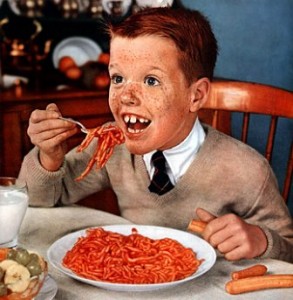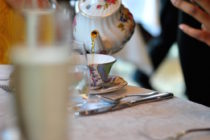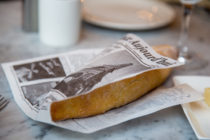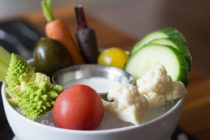Still stuck in my memory is the night my mother placed before me a plate of soggy spaghetti.
Presented with the dish when I was around six years old, the spaghetti is memorable because it was the very first time I realized that cooking is a sensory experience that can either delight or disgust the eyes, nose and taste buds.
Up until then I had simply eaten to eat. More involved with my tricycle, my flop-eared wiener dog Muffin, the Wednesday afternoon tap-dancing class and playing cowboys and Indians with kids in the neighborhood, food was far down on my list of interests.
My mother had never been a cook of any sort. An old family joke was that when she married my father not only could she not boil an egg, she probably wouldn’t recognize an egg if it rolled down the countertop and bit her.
Her kitchen act was, I’m sorry to report, a clueless, clumsy, clownish slapstick routine. And when she served that plate of spaghetti, it was as if she’d hit me over the head with a rubber chicken.
If I remember correctly (and I do) she had wildly over-boiled the pasta. Then there was the problem with the sauce. I cannot know for certain, but it’s a good bet that she had tried to follow a recipe found in Betty Crocker’s Picture Cook Book, the only literary kitchen aid I ever saw open on the counter.
But even with Betty’s photo of the sauce to guide her, my mother was lost. Her concoction was a gloppy mess inundated with huge chunks of raw bell peppers, slices of raw onion that were as long and as thick as pinky fingers and black nuggets of ground meat so overcooked it was like killing the cow twice.
Thinking back, I must assume that the sauce’s watery tomato base had been dumped into the skillet directly from a can some time after she’d slaughtered the meat to the color of charcoal, yet before the vegetables had been properly sautéed.
Trying to reconstruct her process, I’d say that once the sauce was just barely heated, she poured the tepid stuff over the noodles and then did what I would now recommend no home cook ever do to pasta. She got out the big metal spoons and went to town. Stirring the chunked-up, ultra-diluted canned tomato sauce into the poor limp pasta, she beat the two together with the same intensity and elbow grease one would give to mixing cookie dough.
Then Mom loaded her creation onto a platter and, presenting it to the family seated round the table, told us to “Eat up.”
Even though my taste buds were young and inexperienced, my eyes were working just fine. To me, what was sitting there waiting to be eaten looked like the inside of Hellboy’s head. A mass of red brains – glutinous, gummy and scary to behold.
I recall saying, “I ain’t eating that!”
I also recall my father saying, “Yes, you are, young lady. Apologize to your mother, and correct your use of contractions.”
Grumbling an un-heartfelt apology, my resolve was unchanged. I would not be forking into dinner that night. Hellboy could freeze over before I could be made to unzip my lips.
Normal supper time was 5:30 when I was a kid. By six I was usually outdoors again for a bit of hide-and-seek with my pals. But when Jill and Sherry and Camille and Bobby and Dirk and Robert and Crazy Johnnie came knocking at the door to fetch me for the game, I was still at the dinner table.
My father explained that I would not be joining them that night, as I had not finished eating. Sitting alone at the table, I had not taken one single bite. The spaghetti, which had started out lukewarm, was now truly cold.
I will say this about my mother: Nice lady. A nice lady who, even though she couldn’t cook, was always sympathetic to the needs of her children. So, when the clock ticked around to 8:30, she did make an earnest plea for my release.
“I think our girl’s learned her lesson,” said my mother to my father. “Let’s dump the spaghetti and let her go to bed.”
I guess I have to say this about my father: Stubborn as the day is long. But so was I. The situation was a case of his will pitted against my will. Trapped in the dining room for three hours, with nothing to do but stare at noodles, I had locked my arms across my chest and made defiance the banner of my no-eat campaign.
At nine everybody went to bed. My mother, my father, my little sister and my little brother all got between the sheets and sailed off to dreamland. My father’s final instruction before sauntering down the hallway to his bedroom was, “Do not leave the table until you clean that plate.”
I’m not sure how many modern-day youngsters would take that sort of dictate seriously, but back in the Stone Age, disobeying would have won me a spanking. I may have been stubborn, but I wasn’t stupid. So I stayed put.
They had left the dining room light on – all other lights in the house had been turned off – and with the silence broken only by cicadas outside the screened-in window and my father’s distant snoring, boredom was my company. I remember humming something, and I remember that I played with my food.
There upon my mother’s white tablecloth I spelled out my name with cold spaghetti. Picking out long, tomato-encrusted noodles from the plate one by one, I formed the letters of my name across the cloth-covered dining table: MICKI. Then, twisting the remaining noodles to look like roses, I added decoration around the perimeters, using green pepper chunks as leaves. Proudly, I scooted my chair from the table and went to bed.
I had done as he ordered. I had cleaned my plate of spaghetti.
I have to say this about both of my parents: Great senses of humor. When I awoke the next morning, they were standing over my spaghetti doodle, trying to muffle their giggles. My father looked at me sternly, but there was a twinkle in his eye.
My mother never got the stains out of the tablecloth. She couldn’t do laundry either.









Follow Us